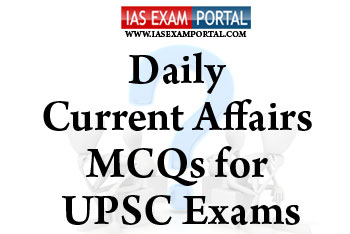Current Affairs MCQ for UPSC Exams - 06 October 2018

Current Affairs MCQ for UPSC Exams - 06 October 2018
Q1. Which of the following are the features of the organ transplantation amendment act 2014 brought in to replace the 1994 act :
1) The mandatory presence of a neurosurgeon to declare brain death was altered
in the amended act, allowing any physician or anesthetist approved by the
appropriate state authority, can be the member of the board of medical experts
for certification of brain death.
2) Unlike the 1994 act which gave no clarity on who would bear the cost of donor
maintenance, the amendment clearly states that the cost of donor maintenance,
retrieval of organs and tissues, their transportation and preservation, may be
borne by the recipient or institution or government or non-government
organisation.
3) The 2014 amendments allowed any hospital with intensive care facilities and
ventilators to retrieve organs.
a) 1 & 2only
b) 2 & 3only
c) 1 & 3only
d) all of the above
Q2.Which of the following was the reason for death of lions in large numbers in the Gir national park in Gujarat since September :
a) Heavy rains causing depletion of food materials in the region.
b) Massive migration of wild buffalos/preys.
c) A combined effect of canine distemper virus &protozoal infections.
d) Illegal poaching of lions for their claws & hair
Q3. Which of the following statements regarding millet cultivation/production are true :
1) Millets are important crops in the semiarid tropics of Asia and Africa
(especially in India, Mali, Nigeria, and Niger), with 97% of millet production
in developing countries.
2) The use of millets as food fell between the 1970s and the 2000s, both in
urban and rural areas, as developing countries such as India have experienced
rapid economic growth and witnessed a significant increase in per capita
consumption of other cereals.
3) Andhra Pradesh is known as the millet capital of India .
a) 1 & 2only
b) 2 & 3only
c) 1 & 3only
d) all of the above
Q4. Which of the following are not one of the powers/functions of the election commission of India :
1) Demarcation of boundaries of the Parliamentary Constituencies as per
provisions of the Delimitation Act.
2) Advice to the president.
3) Scrutinise the accounts of election expenses submitted by contestants.
4) Recognition of Political Parties and Allotment of Symbols.
a) 1 & 2 only
b) 3only
c) 1 only
d) 2 only
Q5. The nobel prize for chemistry was given to Mr.Smith who used bacteriophages to direct evolution of new proteins. ‘bacteriophage ‘ refers to which of the following :
a) A bacteria that can infect a virus.
b) A virus that can infect a bacteria
c) A protein required for metabolic activities.
d) A virus that activates the antibodies of the immune system.

